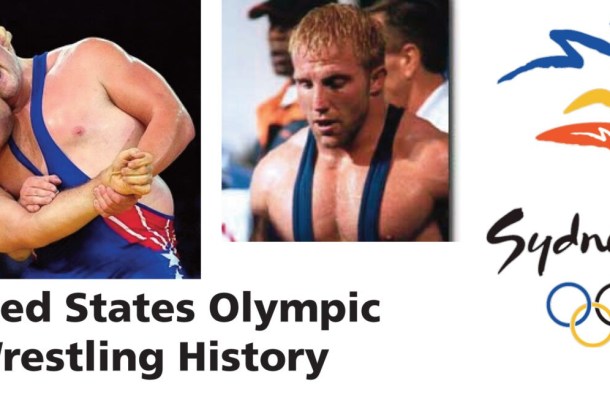Gardner and Slay earned stunning upsets over Russians in 2000 Olympics

By Bryan Van Kley, WIN Publisher
SYDNEY — The Cold War, at least on the mat, was not over as the 2000 Olympics fueled the fire between the United States and the Russian Federation.
And igniting the match was a trio of young Americans, who left Australia with gold medals after knocking off a trio of Russians who previously made their marks on Olympic history.

Rulon Gardner (right) scored just one point to beat 13-time Olympic/World champion Alexander Karelin of Russia in the 2000 Olympic finals.
The biggest upset came at heavyweight in Greco-Roman where Rulon Gardner defeated three-time Olympic gold medalist Alexander Karelin, 1-0, in overtime.
“I still think he is the best wrestler in the world,” said Gardner, a native of Afton, Wyom., who had very little international experience before the Sydney Olympics. “I’m numb. This is still a dream for me.”
The only point scored in the match came when Karelin was penalized 20 seconds into the second period when the Russian broke the clinch. This was the first point scored against Karelin — who entered the Olympics with 13 straight World or Olympic titles — in over a decade.
Three days before this historic battle, Gardner’s 20-year-old Greco-Roman teammate Garrett Lowney (213.75) took out World champ Gogui Koguouachvili of Russia. Lowney used a five-point move in overtime to win, 8-3, helping the redshirt freshman from Minnesota reach the quarterfinals.
“I’ve always wanted to compete in the Olympics,” Lowney said. “I showed the world what I wanted to show them.”
Unfortunately, Lowney’s gold-medal dream ended two matches later when he lost a semifinal bout to Sweden’s Mikael Ljungberg, 8-1. The native of Freedom, Wisc., did come back to win his bronze-medal match, defeating Thanos Konstantinos of Greece, 3-1.
Also in Greco, Matt Lindland earned a silver medal as he reached the finals before losing 3-0 to Russian Mourat Kardanov.
Brandon Slay, who made the Olympic Team when he first upset Joe Williams at the U.S. Open earlier that summer, added the final piece to the United States’ “Triple-Crown Upset” when the 167.5-pound freestyle wrestler upset Russia’s Bouvaissa Saitiev, 4-3, in a second-round match.

Brandon Slay (right) ended a five-year unbeaten run by Russia's Bouvaissa Saitiev during the 2000 Olympics in the 76-kilo weight class.
Slay set the tone early, hitting a double-leg takedown just seconds into the match, then immediately threw a gutwrench on Saitiev and led 3-0 before the Russian knew what happened.
The Russian responded with a quick reversal and two takedowns before the first period ended, tying the match, 3-3. No one scored in the second period, which forced overtime.
The short, stocky Slay, a native of Amarillo, Texas, was having trouble getting in on a single against the much longer Saitiev most of the match. So Slay attacked the Russian with a power double ending with a victorious thud which could have been heard back in the States.
“I knew that I could beat him if I wrestled to my full potential,” Slay said. “I was excited because that could have potentially been my finals match.”
Slay did win two more matches to reach the championship against Germany’s Alexander Leipold, who appeared to have ended Slay’s bid for gold when the 1994 World champion recorded a 4-0 victory.
“I know I am the best in the world anyway,” Slay said. “God must just have something different planned.”
Two weeks later, Slay understood that plan even more when it was determined Leipold failed a drug test and was stripped of the gold medal.
This would be the only gold medal won by the United States in freestyle but Sammie Henson earned a silver medal at 119 pounds and both Terry Brands (127.75) and Lincoln McIlravy (152) left Sydney with a bronze medal.
It was a painful finals loss for Henson, the 1998 World champion who lost, 4-3, to Azerbaijan’s Namig Abdullayev, who held off Henson’s takedown attempts by pulling on the American’s singlet.
Both Brands and McIlravy reached the semifinals before the former Iowa Hawkeyes lost. Brands, a former two-time World champion, lost 6-4 to Iran’s Alireza Dabir, also a former World champ. McIlravy, meanwhile, lost 3-2 to rival Daniel Igali of Canada.
Both men came back to win their bronze medal matches.
“I never liked bronze medals and I still don’t,” said McIlravy. “It’s not what I came here for.”
“When you get devastated by being knocked out of the gold-medal round and you have to go for a bronze medal, it’s hard because you have been waiting for this all your life,” Brands said.
Among the other Americans who placed in freestyle were Charles Burton and Kerry McCoy. Each finished fifth, respectively, at 187.25 pounds and heavyweight. Jim Gruenwald (127.75) and Kevin Bracken (138.75) each finished sixth in Greco.







